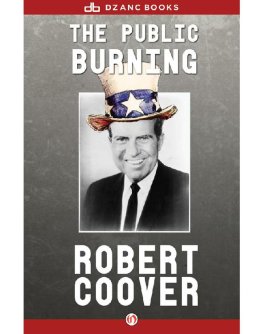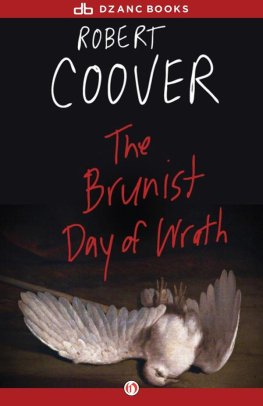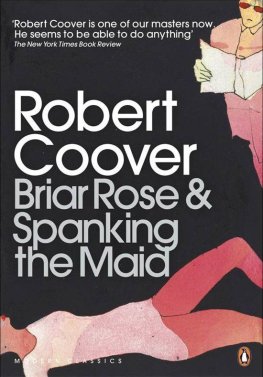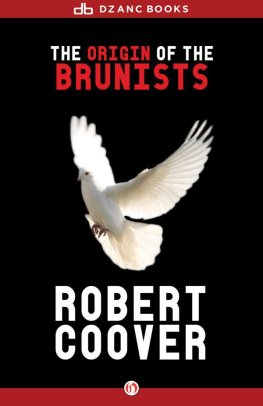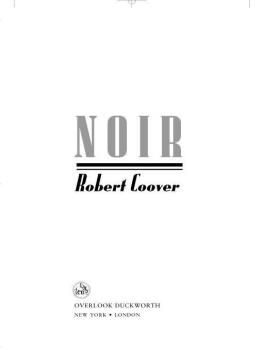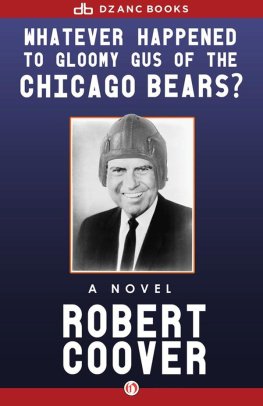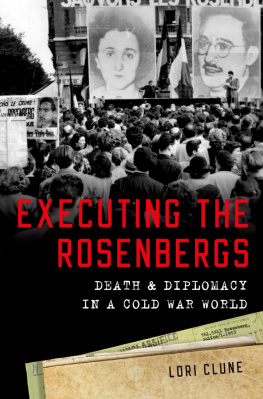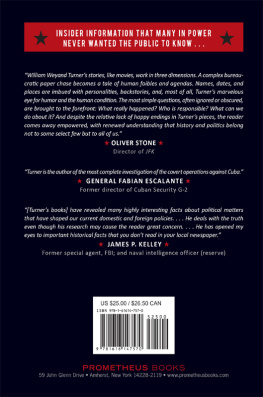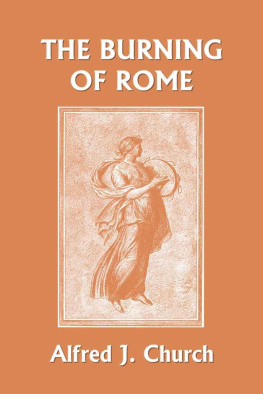Robert Coover
Public Burning
FOR JUSTICE WILLIAM O. DOUGLAS,
who exchanged a greeting with me while
out walking on the old canal towpath
one day not long after these events
For the sixth time, the mousy little engineer and his wife, waiting in Sing Sings death house, had petitioned the highest tribunal. For the sixth time, a majority of the nine Justices rejected a Rosenberg appeal. Then, as the clock ticked on toward 11 p.m. Thursday, the hour of death for the spies, Supreme Court Justice William Douglas acted alone. Unexpectedly, the court having recessed for the summer, he granted the stay of execution that the full court had denied. That touched off, within the next 24 hours, one of the most dramatic and novel episodes in all the august annals of the U.S. Supreme Court.
The Last Appeal, TIME, June 29, 1953
Thats what Im counting on most of all the stories.
JOSEPHINE PARIS (as played by Ethel Rosenberg) in The Valiant, by H. E. Porter and Robert Middlemass
Of course, none of us had much money at the time, so we would just meet at someones house after skating and have food, a spaghetti dinner or something of that type, and then we would sit around and tell stories and laugh. Dick was always the highlight of the party because he has a wonderful sense of humor. He would keep everybody in stitches. Sometimes we would even act out parts. I will never forget one night when we did Beauty and the Beast. Dick was the Beast, and one of the other men dressed up like Beauty. This sounds rather silly to be telling it now, but in those days we were all very young. It was good, clean fun, and we had loads of laughs.
MRS. RICHARD NIXON
All my humor is situation stuff.
MR. RICHARD NIXON
I did not come to tell you things that you know as well as I.
DWIGHT DAVID EISENHOWER April 7, 1953
On June 24, 1950, less than five years after the end of World War II, the Korean War begins, American boys are again sent off in uniforms to die for Liberty, and a few weeks later, two New York City Jews, Julius and Ethel Rosenberg, are arrested by the FBI and charged with having conspired to steal atomic secrets and pass them to the Russians. They are tried, found guilty, and on April 5, 1951, sentenced by the Judge to die thieves of light to he burned by light in the electric chair, for it is written that any man who is dominated by demonic spirits to the extent that he gives voice to apostasy is to be subject to the judgment upon sorcerers and wizards. Then, after the usual series of permissible sophistries, the various delaying moves and light-restoring counter moves, their fate as the U.S. Supreme Court refuses for the sixth and last time to hear the case, locks its doors, and goes off on holiday is at last sealed, and it is determined to burn them in New York Citys Times Square on the night of their fourteenth wedding anniversary, Thursday, June 18, 1953.
There are reasons for this: theatrical, political, whimsical. It is thought that such an event might provoke open confessions: the Rosen bergs, until now tight-lipped and unrepentant, might at last, once on stage and the lights up, perceive their national role and fulfill it, freeing themselves before their deaths from the Phantoms dark mysterious power, unburdening themselves for the people, and might thereby bring others as well-to the altar, as it were-to cleanse their souls of the Phantoms taint. Many believe, moreover, that such a communal pageant is just what the troubled nation needs right now to renew its sinking spirit. Something archetypal, tragic, exemplary. Things have not been too good since the new war began especially since the Chinese Reds came swarming across the Yalu and put our boys to rout theres a need for distractions, and who knows? done right, it could bring a new excitement into the world, lift hearts, get things moving again, maybe even bring victory to the Free Peoples of Asia, courage to the rioting workers in enslaved Eastern Europe, fertility and tax reductions to the nation, all this is possible. And though the delays in the courts have at times perhaps been worrying, it is all coming together now in this time and place like magic. Fourteen, after all, symbolizes fusion and organization, justice and temperament; the City is this year celebrating the tercentenary of its own founding as New Amsterdam, its axis the Times Tower is in its Silver Anniversary year, and the Statue of Liberty Our Lady of the Harbor, Refuge of the Destitute, Ark of the Covenant, Regina Coeli, Mother Full of Goodness, Star of the Sea and Gem of the Ocean is sixty-nine; Times Square itself is an American holy place long associated with festivals of rebirth; and spring is still in the air. It is even hoped that a fierce public exorcism right now might flush the Phantom from his underground cells, force him to materialize, show himself plainly in the honest electrical glow of an all-American night-on-the-town, give Uncle Sam something to swing at besides a lot of remote gooks.
Weeks before, the designated area is cordoned off with police barricades and a stage is erected at the intersection of Broadway and Seventh Avenue on top of the information kiosk. This stage is built to simulate the Death House at Sing Sing, its walls whitewashed and glaringly lit, furnished simply with the old oaken electric chair, cables and heating pipes, a fire extinguisher, a mop and bucket for cleaning up the involuntary evacuations of the victims, and a trolley for carting the corpses off. The switch is visible through an open door, stage right, illuminated by a hanging spot. Other elegantly paneled doors, right, exit off to press and autopsy rooms, and upstage left another door leads in from the Last Mile, or Dance Hall. Over this entry, which the Rosenbergs will use, a sign is tacked up that reads: SILENCE. Details from the set of the Wardens Office in The Valiant, a one-act melodrama by Holworthy Hall (pseud.) and Robert Middlemass about a condemned man wrongly accused, produced in the early thirties by the Clark House Players on the Lower East Side and featuring starry-eyed sixteen-year-old Ethel Greenglass, are incorporated (a telephone instrument, a row of electric bell buttons, a bundle of forty or fifty letters, etc.), partly to make Ethel feel more at home, partly to impress upon her the ironies of her situation, partly just to surprise her with a little jolt of dj vu.
Special seating sections are set up out front, camera platforms are built, backstage VIP passageways, wedding altars, sideshows, special light and sound systems. The streets funneling into Times Square are hung with bunting (the Square is not a square at all, of course, and from above the decorated area looks a little like a red-white-and-blue Star of David); traffic is rerouted so as to cause maximum congestion and rage, a solid belt of fury at the periphery being an essential liturgical complement to the melting calm at the center; and billboards and theater marquees, the principal topographical feature of the district, are consecrated to the display of homespun American wisdom:
EVERY MAN MUST CARRY HIS OWN HIDE TO THE TANNER
OUR LIVES ARE MERELY STRANGE DARK INTERLUDES IN THE ELECTRICAL DISPLAY OF GOD THE FATHER!
AMERICA THE HOPE OF THE WORLD
NICE GUYS FINISH LAST
THREE MAY KEEP A SECRET IF TWO OF THEM ARE DEAD
An Entertainment Committee is appointed, chairmanned by Cecil B. De Mille, whose latest success was last years Oscar-winning Greatest Show on Earth, with assistance from Sol Hurok, Dan Topping, Bernard Baruch, the AEC and Betty Crocker, Conrad Hilton, whose Albuquerque hotel figured prominently in the prosecutions case against the Rosenbergs, Sam Goldwyn and Walt Disney, Ed Sullivan, the director of the Mormon Tabernacle Choir, the various chiefs of staff, Sing Sing Warden Wilfred Denno, the Holy Six, and many more. They audition vocalists, disk jockeys, preachers, and stand-up comics, view rushes of Uncle Sams new documentary on the two little Rosenberg boys intended as a back projection for the burnings, commission Oliver Allstorm and His Pentagon Patriots to compose a special pageant theme song, assign a task force of experienced sachems to work up a few spontaneous demonstrations, and hire a Texas high-school marching band to play One Fine Day from

